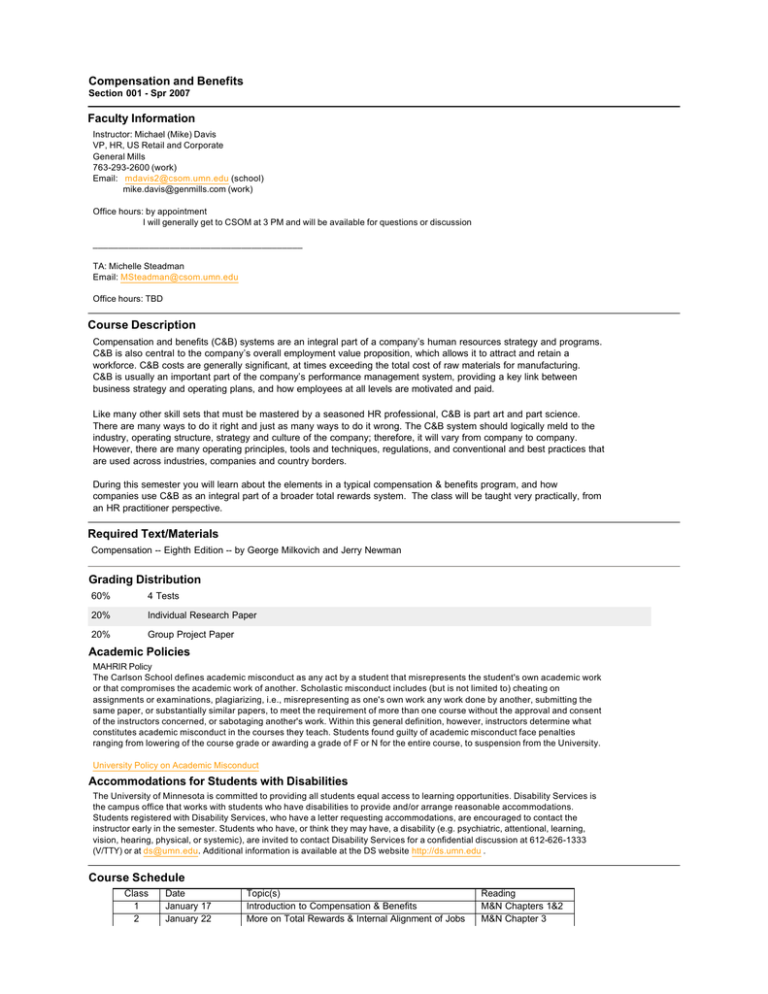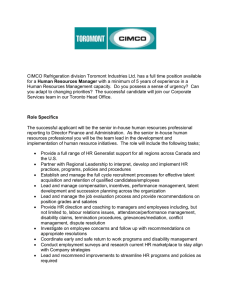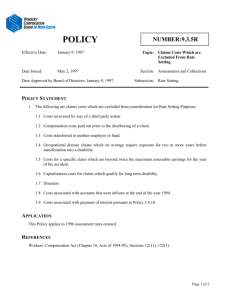Compensation and Benefits Faculty Information Section 001 - Spr 2007
advertisement

Compensation and Benefits Section 001 - Spr 2007 Faculty Information Instructor: Michael (Mike) Davis VP, HR, US Retail and Corporate General Mills 763-293-2600 (work) Email: mdavis2@csom.umn.edu (school) mike.davis@genmills.com (work) Office hours: by appointment I will generally get to CSOM at 3 PM and will be available for questions or discussion _________________________________________ TA: Michelle Steadman Email: MSteadman@csom.umn.edu Office hours: TBD Course Description Compensation and benefits (C&B) systems are an integral part of a company’s human resources strategy and programs. C&B is also central to the company’s overall employment value proposition, which allows it to attract and retain a workforce. C&B costs are generally significant, at times exceeding the total cost of raw materials for manufacturing. C&B is usually an important part of the company’s performance management system, providing a key link between business strategy and operating plans, and how employees at all levels are motivated and paid. Like many other skill sets that must be mastered by a seasoned HR professional, C&B is part art and part science. There are many ways to do it right and just as many ways to do it wrong. The C&B system should logically meld to the industry, operating structure, strategy and culture of the company; therefore, it will vary from company to company. However, there are many operating principles, tools and techniques, regulations, and conventional and best practices that are used across industries, companies and country borders. During this semester you will learn about the elements in a typical compensation & benefits program, and how companies use C&B as an integral part of a broader total rewards system. The class will be taught very practically, from an HR practitioner perspective. Required Text/Materials Compensation -- Eighth Edition -- by George Milkovich and Jerry Newman Grading Distribution 60% 4 Tests 20% Individual Research Paper 20% Group Project Paper Academic Policies MAHRIR Policy The Carlson School defines academic misconduct as any act by a student that misrepresents the student's own academic work or that compromises the academic work of another. Scholastic misconduct includes (but is not limited to) cheating on assignments or examinations, plagiarizing, i.e., misrepresenting as one's own work any work done by another, submitting the same paper, or substantially similar papers, to meet the requirement of more than one course without the approval and consent of the instructors concerned, or sabotaging another's work. Within this general definition, however, instructors determine what constitutes academic misconduct in the courses they teach. Students found guilty of academic misconduct face penalties ranging from lowering of the course grade or awarding a grade of F or N for the entire course, to suspension from the University. University Policy on Academic Misconduct Accommodations for Students with Disabilities The University of Minnesota is committed to providing all students equal access to learning opportunities. Disability Services is the campus office that works with students who have disabilities to provide and/or arrange reasonable accommodations. Students registered with Disability Services, who have a letter requesting accommodations, are encouraged to contact the instructor early in the semester. Students who have, or think they may have, a disability (e.g. psychiatric, attentional, learning, vision, hearing, physical, or systemic), are invited to contact Disability Services for a confidential discussion at 612-626-1333 (V/TTY) or at ds@umn.edu. Additional information is available at the DS website http://ds.umn.edu . Course Schedule Class 1 2 Date January 17 January 22 Topic(s) Introduction to Compensation & Benefits More on Total Rewards & Internal Alignment of Jobs Reading M&N Chapters 1&2 M&N Chapter 3 3 4 January 24 January 29 5 January 31 6 7 8 9 February 5 February 7 February 12 February 14 10 11 12 13 14 15 16 17 18 19 20 21 February 19 February 21 February 26 February 28 March 5 March 7 March 12 March 14 March 19 March 21 March 26 March 28 22 23 24 25 26 27 28 29 April 2 April 4 April 9 April 11 April 16 April 18 April 23 April 25 30 31 April 30 May 2 Discussion of Individual Research Paper Job Analysis & More on Salary Structures Job Evaluation Discussion of Group Project Person-Based Structures & Defining Competitiveness Market Pricing, Surveys and Use of Survey Data Exam 1 Pay for Performance I - Introduction Guest Lecturer (BAE Systems) & Pay for Performance II - Behaviorial Theory Pay for Performance III - Performance Measurement Pay for Performance IV - Short Term Incentives Pay for Performance V - Long-Term Incentives Exam 2 Performance Management & Non-Monetary Rewards Benefits I - Introduction NO CLASS - Spring Break NO CLASS - Spring Break NO CLASS - Work on your paper! NO CLASS - Work on your paper! Benefits II - Health Benefits Benefits III - Retirement & Savings Plans GUEST - Bob Leone, Hewitt Associates INDIVIDUAL PAPER DUE Extra Session to Review Benefits Exam 3 Total Reward Strategy Executive Compensation I - Introduction Executive Compensation III - GE CC Meeting Executive Compensation IV - Critics Perspective International C&B GUEST Stephanie Lilak Special Compensation Issues GROUP PROJECT DUE Public Policy Issues Exam 4 M&N Chapter 4 M&N Chapter 5 M&N Chapters 6&7 M&N Chapter 8 None M&N Chapter 9 M&N Chapter 10 None None None None M&N Chapter 11 M&N Chapter 12 Enjoy Enjoy M&N Chapter 13 None None None M&N Chapter 2 M&N Chapter 14 GE Materials Sears Case M&N Chapter 16 None None We're Done!





